Fabio Casati, ServiceNow and University of Trento, and Kannan Govindarajan, ServiceNow
Taking AI from research to production – at scale
The lectures will focus on what it takes to bring AI research ideas into production, at scale, in the complex environment that companies face today. Specifically, we will focus on how SaaS enterprise applications that serve multiple customers can ship machine learning functionality that is applicable to multiple customers. Adoption of AI in business is rather low, especially when compared to the hype AI is having in the last decade. The reason for this is that there are a large set of challenges that go well beyond a good algorithm, which are rarely discussed or analyzed. In these lectures we will do just that: We will cover what it takes to bring AI from idea to production, at scale. We will cover challenges – and solutions – ranging from devops to managing requirements and expectations, handling data governance and security and promoting adoption once the dev cycle – and even the sales cycle- has completed.
The classes will be hands on, in the sense that we will simulate a small-scale design and devops cycle.
The expected learning outcome is for attendees to:
- Have a full understanding of what are the challenges in taking AI in production
- Understand best practices for overcoming them
- Know how to structure a devops team and a process set up for success
- How to manage the end-to-end process from engineering requirements to promoting adoption
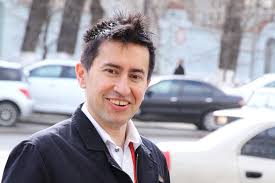
Fabio Casati is a principal machine learning engineer at Servicenow, where he focuses on Machine Learning (ML) Platform architecture and on algorithms for process ML. Previously he was a professor of software engineering and Business Process Management at the University of Trento. In that role, he started research lines on hybrid human-machine computations and on technologies for happiness and life participation, focusing on achieving direct positive impact on society through tangible artefacts adopted by the community. He co-authored a best-selling book on Web services and is author of over 250 peer-reviewed papers. Prior to that, he was technical lead for the research program on business process intelligence in Hewlett-Packard USA, where he contributed to several HP commercial products in the area of web services and business process management.
Dr. Kannan Govindarajan is currently Senior Director/Distinguished Engineer at ServiceNow, a leading enterprise SaaS company where he leads the AI/Machine Learning engineering team in ServiceNow platform. He was co-founder of a ML/AI startup, DxContinuum, that got acquired by ServiceNow in 2017. Prior to DxContinuum, he served as Director, Strategy and Planning, for HP’s $27B erstwhile Enterprise Services business where he outlined the five-year vision for the business and drove the strategic plans for cloud offerings. He also served as Chief Technologist for HP’s outsourcing business, led product marketing for HP’s massively parallel data-warehousing platform, Neoview, started HP’s services group at HP Labs, and served as architect of HP’s pioneering web services product, E-Speak in a 14 year career at HP. Prior to joining HP, he was with Oracle, where he was responsible for parts of Oracle’s Java infrastructure within the database. Kannan Govindarajan holds a bachelors degree in computer science from the Indian Institute of Technology Madras, a doctorate in computer science from University at Buffalo (SUNY) and a masters in management from MIT Sloan School of Management.
Adrian Cockcroft, Amazon Web Services
Building and Operating Modern Applications
Modern applications are designed to evolve rapidly, scale automatically, and are distributed to optimize for latency and availability. They are microservices built on dynamically allocated cloud platforms, use serverless and container-based technologies, and are produced and operated by small independent teams. These lectures will address the needs of developer-oriented and startup organizations for rapid development of business value, and also operations oriented and large enterprise organizations who are managing risk and need highly resilient architectures. Topics include the management and organizational structures that have been shown to support rapid innovation for industry-leading organizations; the three stages of transformation – learning to go fast, building cloud-native at scale, and migrating strategic workloads; moving development time-to-value from months to days using serverless first; and combining cloud regions, chaos engineering and hazard modeling techniques into a continuous resilience pattern that replaces and improves on traditional datacenter disaster recovery practices.

Adrian Cockcroft was a Distinguished Engineer at Sun Microsystems specializing in capacity planning, scalability, and high availability for large vertically scaled servers before moving to eBay Research Labs as Distinguished Availability Engineer working on horizontally scaled architectures, NoSQL storage models and datacenter cost models. He was recruited to Netflix as they began to scale their video streaming service and led the definition and open sourcing of their AWS based cloud architecture. In 2014 he joined venture capital firm Battery Ventures and was one of the early proponents of DevOps, microservices, containers and serverless patterns. For the last three years he’s been VP of cloud architecture at AWS, recruited the open source team, joined CNCF and led the creation of programs to support social media, open source events, foundations, and AWS credits for open source projects.
Giulia Rossi, Amazon Web Services

How Amazon Innovates and how you can innovate like Amazon
Organizations of all sizes often ask how they can innovate like Amazon. Since its humble beginnings as the “world’s largest bookstore,” Amazon has not only innovated across e-commerce and other adjacent segments, it has also introduced entirely new and unrelated businesses to the organization. Over the years, Amazon has gotten good at taking problems that are hard to solve and making them easy for customers. In this session, we discuss how Amazon views and leverages technology as a utility to increase the pace of innovation across the organization.
Giulia Rossi is leading the Digital Innovation Program in Southern Europe in Amazon Web Services (AWS), her mission is to contribute to the innovation of companies of all sizes, demonstrating that all of them can offer a better service to their customers and stimulate their business thanks to the democratization of technology that is enabled by cloud computing. She has worked in many industries in Digital Innovation like IoT, Smart City, Cyber Security, TELCO Mobile. Board Member of Women&Technologies in Italy she supports mentoring and caching young women professional to foster more active women in STEM.
Elisabetta Di Nitto, Politecnico di Milano
The role of Infrastructure as Code and the Cloud in DevOps
The current IT market is increasingly dominated by the “need for speed”. This need is reflected in the emerging use of agile and lean techniques which shorten the software development cycle and intermix software development activities with IT operations. DevOps is the lifecycle that includes and integrates all such techniques, together with organizational and managerial guidelines into a coherent framework. In this lecture, we will focus on two main ingredients of DevOps, namely, Infrastructure as Code (IaC) and Cloud Computing. Both provide powerful tools to DevOps as they enable unprecedented levels of automatization of Ops activities. We will discuss about advantages and disadvantages of IaC and Cloud in the context of DevOps and we will identify open research challenges in both domains.
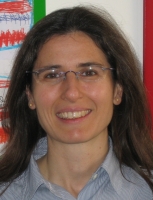
Elisabetta Di Nitto is Full Professor at Politecnico di Milano. Her expertise lies in the area of software engineering and, in particular, of large-scale, open, service-oriented systems with a special attention to the techniques to make these systems self-adaptable to the changes in the environment and in the performances of its distributed components, and to enable them to identify and incorporate new components at runtime. Recently, she has been focusing on Cloud Computing and, in particular, on how to design applications that can run on multiple clouds in order to limit vendor lock-in and to increase availability and reliability of such applications.
Valéry Issarny, INRIA
The Web for the age of the IoT
The Internet of Things that allows integrating the physical with the virtual world creates endless opportunities for new applications but also challenges for today’s and next generation software systems. Indeed, while the IoT brings the data that AI-based systems need, it exacerbates well-known challenges of distributed software systems: heterogeneity, scale, resource-efficiency, availability, quality of service/information. The lectures will survey the technologies that bring the IoT to the Web, from deployed solutions to the ones that are largely still under research to address the challenges that keep arising. The lectures will in particular highlight the key role of middleware solutions to tame the complexity associated with the collection of data from heterogeneous things. They will also introduce how proven software engineering techniques, such as stepwise refinement, may ease the development of IoT systems.
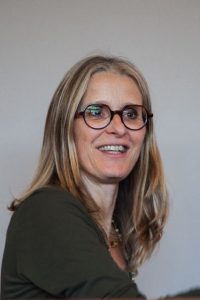
Valérie Issarny holds a “Director of research” position at Inria, the French institute for research in Digital sciences, where she led the ARLES research team until 2013, investigating distributed software systems leveraging wirelessly networked devices, with a special emphasis on service-oriented systems. She studies middleware solutions easing the development of distributed collaborative services, including mobile services deployed over smartphones and interacting with sensors and actuators. From 2013 to 2018, she coordinated the Inria CityLab program dedicated to smart cities and promoting citizen engagement; the program was developed in collaboration with CITRIS at University of California Berkeley, targeting urban-scale experiment in Paris and California cities. Related projects included Ambiciti on urban pollution monitoring through participatory sensing and crowd sourcing, and SocialBus on a middleware solution enabling interactions across social media to support democratic assembly and collective actions. Valerie has published over 200 technical papers. She is associate editor of ACM TAAS, ACM TIOT, IEEE TSC and IEEE TSE.To know more, visit: http://valerie-issarny.me/
Erik Meijer, Facebook
Software Development At Scale
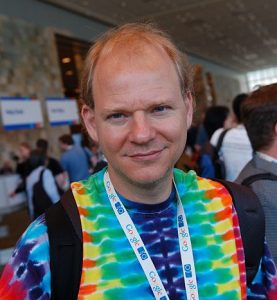
In this series of lectures we will double click on the software development process at industrial scale. We will (literally 😉 illustrate the whole gamut, from the organizational structure, team building, project and people management, short & long term planning, source control, continuous integration and continuous deployment, release management, testing and verification, bug tracking, programming languages, …, all the way down to best practices and bespoke tooling to support developer collaboration and coding workflows.
Erik Meijer is an accomplished language, API, and type system designer, and has worked on the design of Haskell, Mondrian, C#, Visual Basic, Dart, and Hack, as well as advised on the design of Java, Scala, Javascript, and Kotlin.
At Microsoft, after working on languages and runtimes, he focussed on Cloud Programmability. He is the original inventor of Rx, which has spawned many derived implementations in nearly every language in use, and was the technology he tried to market with Applied Duality.
At Facebook he revamped the server-side programming stack to be on par with industry leading frameworks like Java and .NET and created infrastructure that allows product developers to make their applications reactive by subscribing to changes in the social graph. Most recently, he is working on democratizing ML, by enabling developers to use and compose machine learned models, and applying ML to automate the developer experience, and infrastructure.
Bertrand Meyer, Politecnico di Milano, Innopolis University, Eiffel Software, and School Director:
Software from beginning to end: a comprehensive method
Software construction has many facets: project management, requirements, design, implementation, deployment, continuous update, validation/verification, documentation, reuse, extension…
This set of lectures presents the first iteration of a comprehensive, full-life-cycle approach to building, operating and modifying software, including both management and technical aspects. Particularly intended for the world of DevOps and continuous deployment, it is based on the principle of seamless development and integrates some of the best aspects of agile methods, object-oriented development, CMMI, PSP and formal specification as well as a few novel ideas.
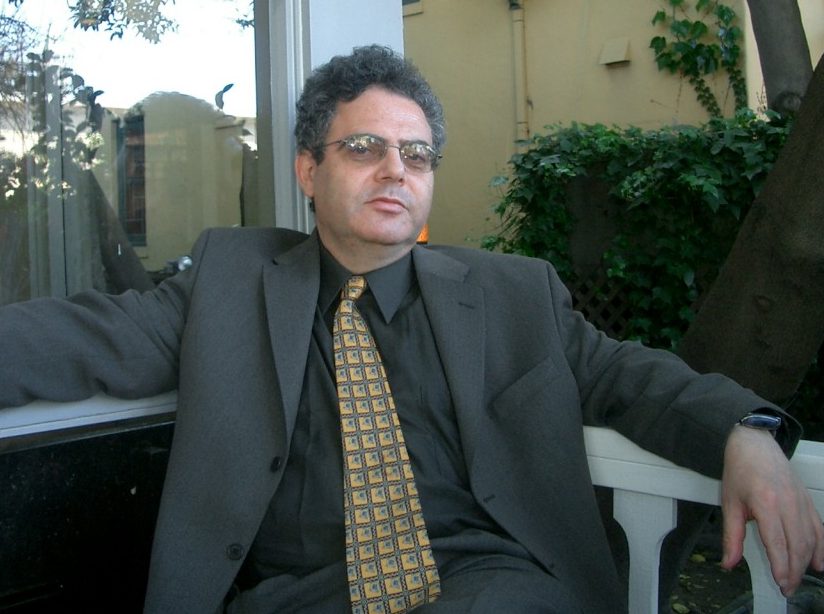
Bertrand Meyer is Provost and Professor at Schaffhausen Institute of Technology (previously at ETH Zurich) and the author of numerous papers and books on various aspects of software engineering.